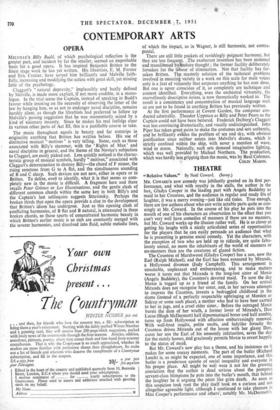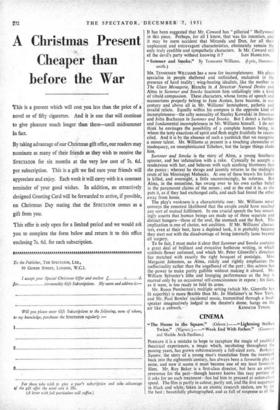THEATRE
"Relative Values.' By NoSI Coward. (Savoy.) MR. COWARD'S new comedy was jubilantly greeted on its first per- formance, and what with royalty in the stalls, the author in the box, Gladys Cooper in the leading part with Angela Baddeley as maid to her Countess, and the audience in regular and ready fits of laughter, it was a merry evening—just like old tinies. True enough, there are few authors about who can write actable parts quite so cun- ningly at Mr. Coward. In the course of his play he puts into the mouth of one of his characters an observation to the effect that you can't very well have comedies of manners if there are no manners, but Mr. Coward works up the illusion rather well. He is so clever at getting his laughs with a nicely articulated series of opportunities for the players that he can easily persuade an audience that what he is presenting is genuine social comedy. Yet the characters, with the exception of two who are held up to ridicule, are quite fabu- lously unreal, no more the inhabitants of the world of manners or no-manners than are the creatures of glazed fiction.
The Countess of Marshwood (Gladys Cooper) has a son, now the Earl (Ralph Michael), and the Earl has been ensnared by Miranda, a Hollywood divorcee (Judy Campbell). This arrangement is unsuitable, unpleasant and embarrassing, and to make matters worse it turns out that Miranda is the long-lost sister of Moxie (Angela Baddeley), the Countess's devoted maid. To save the day Moxie is togged up as a friend of the family. On her arrival Miranda does not recognise her sister, and, in her nervous attempts to impress the Countess, invents a bedraggled childhood in the slums (instead of a perfectly respectable upbringing at Morden or Sidcup or some such place), a mother who had to have beer carried to her in jugs, and a cruel elder sister./ Before the outraged Moxie bursts the dam of her wrath, a former lover of Miranda's, Don Lucas (Hugh McDermott) half dipsomania,cal boxer and half zombie, turns up from Hollywood with affection embarrassingly renewed. With well-bred insults, polite snubs, and ladylike ferocity the Countess drives _Miranda out of the house with her glassy Don, cures her son the Earl ,of his unseemly infatuation, saves "the day for the stately homes, and graciously permits Moxie to revert happily to the status of maid.
But Mr. Coward's new play has a theme, and his insistence on it makes for some uneasy moments. The part of the butler (Richard
• Leech) is, as might be expected, one of some importance, and this butler is a ponderous apostle of social inequality and everyone in his proper place. All might be well were it not for the growing conviction that the author is dead serious about the pompous servant-class blimpisms he puts into the butler's mouth, that behind the laughter he is arguing the paint like grim death. As soon as this suspicion took root the play itself took on a curious and not altogether agreeable light, although I continued to take pleasure in Miss Cooper's performance and others', notably Mr. McDermott's. It has been suggested that Mr. Coward has " pilloried " Hollywood in this piece. Perhaps, for all I know, that was his intention, and it may be mere accident that Miranda and Don, for all their unpleasant and extravagant characteristics, obstinately remain the only truly credible and sympathetic characters. Is Mr. Coward still of the devil's party without knowing it ? 'AIN HAMILTON.



















































 Previous page
Previous page